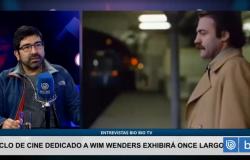The current far-right adjustment has as priority victims, among others, the indigent sectors, workers, students, middle class and retired people, that is, the elderly. The 20th century and the emergence of new liberalisms conspired against old age. Empirical evidence? For the first time in history, old men and women began to be locked up for the mere fact of being old men and women. Nursing homes were invented.
However, in our country a creator stands out who vindicated this discriminated age group and other social exclusions. His anti-oldist, anti-misogynist and anti-homophobic stance built and shines from the screens. Here are his own metaphorical words. “I brought a glass of water, I spat out the water, now drink it.”
Then the question arises: why does that action disgust us? Why does it disgust us? If it is something that comes from our own body, such as the morbidities of sexuality, the expectations and passions of old age, the sexual-affective longings, or the baroque or squalid forms of the cracked bodies that traditional cinema hides and that in the The artist in question shows without limits, with respect and tenderness.
Jorge Polaco (1946-2014) builds a poetics of desire that inflames the flame of life and – despite the “good bourgeois customs” – he shows them in his own way. There are not many creators who invent and forge their own worlds.
This director put into image and sound the sensual desire of the elderly, he did not feel it in his own old age. He died young from an old man’s illness. Today he revives it Maria Onis which, like a contemporary Virgil, invites us to explore the purgatory, heaven and desiring hell that constitutes this incommensurable work of Argentine cinema (with which other could we measure it?). María does it cinematically, that is, with the same medium that she used in the director of the only film censored in democracy in our country after the civil-military dictatorship (Kindergarten, JP, 1989).
Jorge Polaco, is the title of the documentary by María Onis that premiered at BAFICI 2024. It is the product of eleven years of research. A penetration into a baroque, colorful, refined, crazy, hyperbolic and poetic world. Stupor and elegance, Polish universe. The artist to whom the truth is revealed in the naked and multiple bodies such as that of childhood, old age and living things in general (plus that of a mobile corpse). These bodies are displayed, drinking their own saliva without disgust.
María Onis made her documentary as a weaver composing a tapestry. She built the warp with fragments chosen from Polaco’s complete filmography. Materials filmed by himself. The director intertwined strands of short interviews that she herself conducted and that contribute to the kaleidoscopic interpretations of a creation rich in meanings. It produces a kind of pre-established harmony between the archival material and the created one. ad hoc.
And the weaver becomes a colorist. She achieves a certain chromatic serenity despite the colorful stridency of some fragments of Polaco’s luminous cinema. But there is another twist, Onis manages to transfer the patina of the originals from the last century and impregnate it in the recent material, achieving narrative fluidity.
As if it were music, the documentary flows analyzing Polaco’s work, but is elusive about his private life. He just opens some little windows. The film spills Polish aesthetics, but it does not copy, it recreates with originality. It bears the seal of its author and follows the free spirit of its inspiration.
That creative freedom wrenched bits of life from the exotic director. The root cause? The morality of his time that, given the gray times that usually plague our lives and our culture, could be repeated. It is known that yesterday’s porn is today’s erotic and will be – not without liberating efforts – tomorrow’s naive.
Polaco’s sin was having confronted clerical and social prudishness with a mirror. Not because it is provocative, but because it is frontal. Pure art, without concessions. He dared to be original, to remove veils from insubstantial morals, to show raised old men and naked old women to a patriarchal society.
There are themes that cultures hide and – what is worse – demonize. Such as desire in the elderly, same-sex sexuality, and exposure to masturbatory hallucinations. Polaco urged them to come out of the closet and to run happily through bright, clear fields.
María Onis, in a hybridization of art and craft, relives those luminous moments and also shows – through archival material and personal testimonies – the shadows and persecutions that fell on the director and some of its stars: Graciela Borges, Isabel Sarli, Manuel Puig.
It was at the forefront and, to date, it is the only national cinematographic work in which the nudity of two age groups normally marginalized from the billboards is centralized and reiterated: childhood, old age. As well as empowered women who run through their films absent of hypocritical modesty.
The genitalia of children is practically not seen. However, the flaccid penises of the elderly men and the sagging tits of the old women are shaken around like ripe or withered fruits of those who assume their bodies in fullness. An old lady in adult diapers happily shows off her tutu, octogenarians roll around with young men and male octogenarians kiss each other.
* * *
Polaco was a great ironist. María Onis shows some episodes where this Socratic irony is displayed. The director’s exhumation of this semi-hidden gem of Argentine cinema contains the same methodological rigor that Polaco put into her productions and, regardless of the director’s intention when she created her work, today – April 2024 – the fact that both Polish films like Onis’ have been screened at BAFICI and supported by Incaa, and that they are exhibited at a time when libertarian barbarism wants to destroy Argentine cinema are, In addition to being a work of art, a micropolitical action of significant high voltage to fight against those who are trying to destroy our education, our culture, our cinema and our sovereignty.






